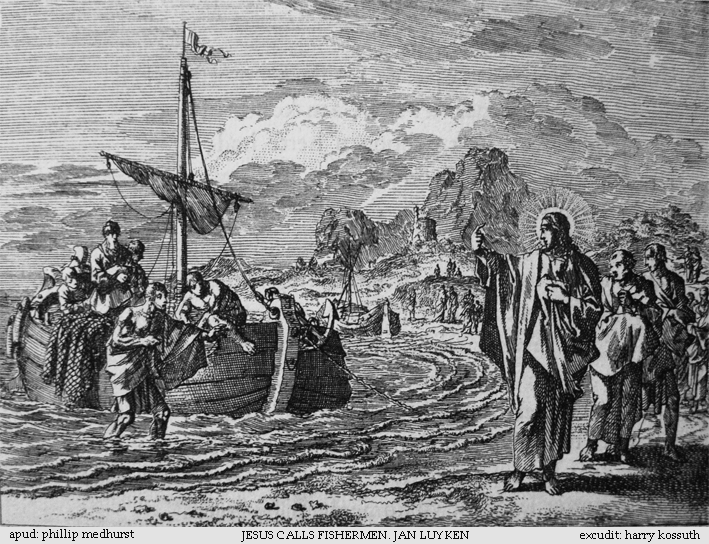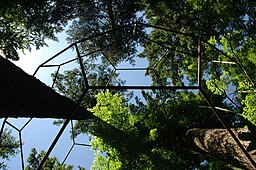Claiming God’s Life
3rd Sunday of the Year B (22 Jan 2012)
Homily of Fr. Paul Panaretos, S.J.
Kingdom is God’s life, God’s measure of reality. As an artist shapes a masterpiece, the Creator gives everything value and purpose. As it is written,
God did not make death, nor does he rejoice in the destruction of the living. For he fashioned all things that they might have being, and the creatures of the world are wholesome.1
To the most wholesome, us, God gave a unique share in God’s life. How do we claim our share in God’s life? We repent. To repent is to align self with God’s measure of reality. In practice to repent is to exchange our limited human measure for God’s more expansive desire for us to be in the world. With effort prophets embodied that more expansive attitude, Jesus most clearly.
Jonah is a case study of repentance. Details about the Jonah account can distract our attention: fish swallowing a human; the large size of the city of Nineveh; its population. The details are not the point; God’s desire to send Jonah as agent of God’s hope for people to be in relationship with God is the point.
Jonah lived within the covenant God had made with Abraham. Covenant-living fostered relationship with God. The covenant established norms for living according to God’s measure so that people in relationship with God could draw others to God. Jonah, whom God called to do that, did not want to be God’s agent, which is why Jonah was aboard a ship. Wanting to measure his way—to deprive the Ninevites of God’s care—Jonah spurned God’s first invitation to preach to Nineveh:
Jonah made ready to flee to Tarshish away from the Lord. He went down to Joppa, found a ship going to Tarshish, paid the fare, and went aboard to journey with them to Tarshish, away from the Lord.2
Natural forces denied Jonah his wish and brought him to the great city. Although effective, Jonah was angry and admitted to himself and God that was why he left home.3 Remarkable reaction, isn’t it, that Jonah, who was part of the covenant, was angry that large numbers of people outside the covenant responded positively to God through him!
Jonah reluctantly brought good news of a gracious and merciful God, slow to anger, rich in clemency, [and] loathe to punish,4 and many responded positively and welcomed his word. It leads me to ponder: Am I more like Jonah or more like the people of Nineveh? Am I a reluctant Catholic, or do I welcome my faith as a gift and the guarantee of my relationship with God, who offers me transforming life?
In a similar way details in the gospel might distract us, especially the immediate response of those Jesus called to follow him in his company. The point isn’t time, it’s relationship: not only does Jesus desire our friendship, Jesus shares his attitude with us: we have the mind of our Messiah, St. Paul encouraged with his gospel.5
Gospel meant good news: of a monarch; of a deity; of a prophet. Mark’s narrative of Jesus shaped another meaning for the word: a chronicle or report. That second meaning has become primary for us. Yet the original meaning, good news, is more dynamic and inviting. Consider it.
When someone tells you, “I have news for you”; or when someone is specific, “Good news!”: our first instinct is to listen. If someone says, “I received some bad news,” we may call forth courage to listen even if we’d rather not. Listening to another binds us. It may be temporary as on a plane, in a store, at the salon or at a class. It may be longer lasting as with schoolmates, neighbors, friends and family.
Listening is not only about others. When we listen to others freely and without filters, we learn about ourselves. Those Jesus called had been seeking for meaning in their lives, hoping for the messiah. Their seeking and hoping shaped their positive reaction to God. Their seeking and hoping freed them to respond to Jesus wholeheartedly, with undivided loyalty, which their immediate and total response to Jesus’ invitation showed. Their seeking and hoping paved their way to weigh things with Jesus’ measure, seeing with God’s vision and calling forth the best in everyone.
The point of today’s scriptures is wholehearted response to God’s compassion, even in the face of things which discount it. We find meaning not in things passing away. We find meaning in our relationships, especially relationship with God. We access God’s compassion the more we respond to it with open hearts and minds, allowing it to shape us as its witnesses.
In your daily 15 minutes with Jesus this week
- Pause in the presence of the Trinity.
- Ask St. Paul to present you to Jesus.
- Speak with Jesus about your determination and energy to respond to Jesus inviting you. Tell Jesus what stands in your way of responding to him.
- Ask for grace to overcome what keeps you from responding wholeheartedly to Jesus.
- Close your time saying slowly the Lord’s Prayer. Its reminder that God’s kingdom dawns on earth as...in heaven encourages us and frees our hearts to respond as we are and to follow Jesus in deed as well as word.
_____________
- Wisdom 1.13-14a.
- Jonah 1.3.
- Jonah 4.1-2.
- Ibid.
- 1Corinthians 2.16.
______________________________________________________________
















